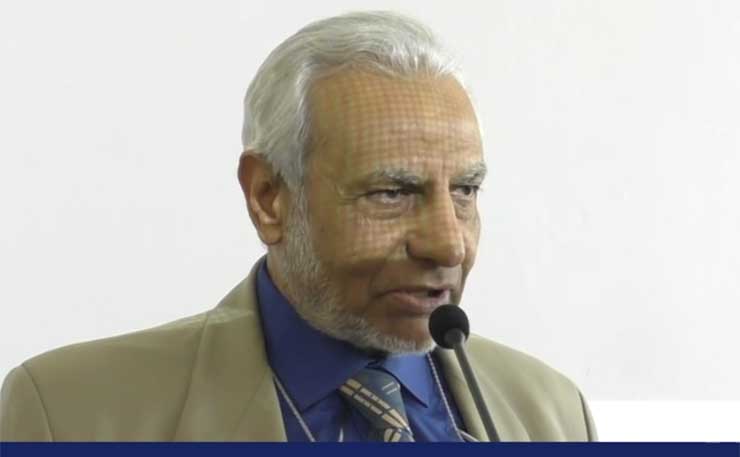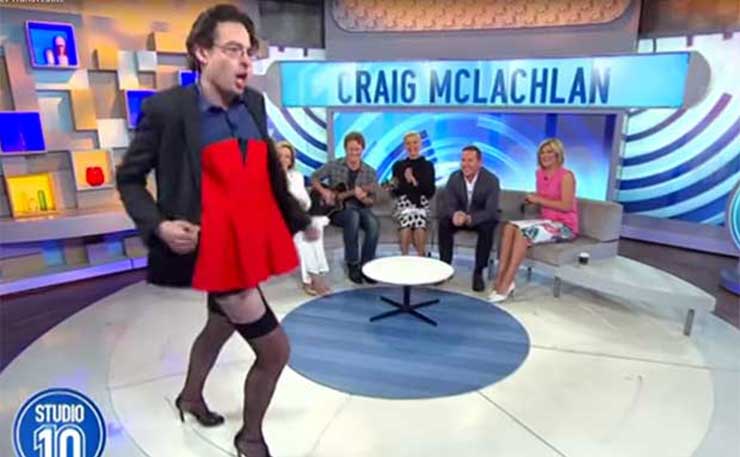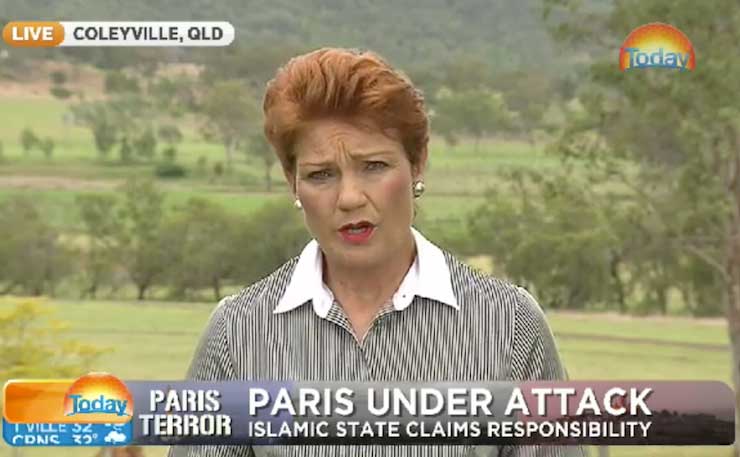Condemnation of terrorism by rote – regardless of whether or not you actually know it’s terrorism – panders to media bigotry and alienates further troubled youth, writes Michael Brull.
Over the weekend, September 10, a day before the 15-year anniversary of the 9/11 attacks in 2001, a 59-year-old man was repeatedly stabbed in Minto. So far, there is very little information about the attack or the attacker. Police allege it was inspired by ISIS, but do not know of any meaningful links the alleged attacker had to “any known terrorist groups”.
Police allege the offender had extremist religious beliefs.
With virtually zero information, the Grand Mufti of Australia, Dr Ibrahim Abu Mohammed issued a statement on Facebook: “Regarding yesterday’s events (Saturday) in Minto (and pending a formal investigation) our position remains firm: Unequivocal condemnation of any terrorist attack that target innocent people and cause panic in the community, and likewise a complete rejection of the ideologies that promote these crimes.”
That is, he doesn’t know what happened, or why, but he condemns it, and the ideology behind it.
To any rational person, this is insane. It is simply a pro-forma condemnation, a hollow gesture based on little more than appeasing anxious white people.
Why bother? Because there would be an intense backlash if the Grand Mufti didn’t indulge this silly Western ritual. Media and politicians would claim that it showed that the Mufti harbours some kind of sympathy with terrorism.
In a statement in December last year, the Grand Mufti affirmed once again his opposition to terrorism. The Australian National Imams Council said there has been a “comprehensive theological refutation” of ISIS, and the “Islamic position on terrorism” has always been “absolutely clear”.
ANIC even claimed that “Islam unequivocally condemns all forms of violence”. Presumably, the goal of such a far-reaching claim is to reassure Australians that Islam is totally innocent and harmless.
In June last year, ANIC said that it “condemns the heinous attacks against innocent people” in Turkey. Those who went back further through ANIC’s media releases could find more condemnations. Just as those interested can find the many, many examples of international Muslim scholars and leaders condemning terrorist attacks and groups like al Qaeda.

Yet it never counts for much. Such Muslim scholars – much like the communities they supposedly lead – forever remain suspect. Recall what happened when the Grand Mufti issued a statement on the attacks in France in November last year. The Mufti and ANIC said they “mourn the loss of innocent lives” in the “terrorist attack”, conveyed their “deepest condolences” to family and friends of those “tragically” killed, and “reiterate that the sanctity of human life is guaranteed in Islam”.
The response was described by the Daily Telegraph as a “torrent of criticism”. The Grand Mufti was apparently too equivocal about the attacks, as he had failed to use the word “condemn”. Perhaps more offensively, the Grand Mufti made some banal comments about the attack. Firstly, he said that, “These recent incidents highlight the fact that current strategies to deal with the threat of terrorism are not working.”
He then said that, “It is therefore imperative that all causative factors such as racism, Islamophobia, curtailing freedoms through securitisation, duplicitous foreign policies and military intervention must be comprehensively addressed.”
Note: he did not claim that these were all of the causative factors. The words “such as” indicate that they are among the factors.
The Daily Telegraph responded with a front page comparing him to a monkey. Senior Coalition figures demanded he condemn the attacks “without reservation”. Janet Albrechtsen wrote, “We are in a battle against Islamist terrorists. Whose side is the Grand Mufti on?” Andrew Bolt wrote, “Dr Ibrahim Abu Mohammed, meant what he said. Excuses over. He really did warn Australians to submit to Muslim demands or risk death.”
Even as they misrepresented the position of the Mufti, the revulsion expressed by some conservative writers made it clear that they understood what was at stake, and what discussion they wanted to prevent.
Joe Hildebrand wrote that, “The great lie of terrorism is to present murderous rage as an expression of a legitimate grievance”. He declared his horror: “The suggestion that we ourselves, Western society, are the true cause of such atrocities”.
It was important to stress that no terrorist could ever have a legitimate grievance. Hildebrand trundled through some of the “usual excuses for terrorism”. That is, “it’s the West’s fault for invading Iraq, even though 9/11 took place a year and a half before the invasion. That it’s the West’s fault for supporting Israel, even though less than a year ago France infuriated Israel by voting to recognise the Palestinian state. That it’s caused by Islamophobia, even though the same people tell us that terrorism has nothing to do with Islam.”
Put aside that it’s not that hard to know what kind of grievances have been cited before 9/11, and Hildebrand’s other non-sequiturs. Even if Hildebrand’s logic applied in all three cases he gives, do none of them sound like legitimate grievances?
Is the destruction of Iraq, the deaths of perhaps a million Iraqis, the exodus of millions of refugees and more a legitimate grievance? Are we to believe that there is not a single Muslim anywhere on the planet who has ever responded to the destruction of Iraq – an entirely legitimate grievance – with an entirely unjustified form of violence?
Are we supposed to believe that that those who are angry about the destruction of Iraq have only responded in entirely civil and polite and genteel ways? Is the rise of ISIS in Iraq some sort of insane coincidence?

Hildebrand’s understanding of the world is best represented with his claim that “Previous Islamic extremist atrocities have been highly symbolic, such as the World Trade Centre and Pentagon attacks, directed at so-called Western decadence”. That is, Hildebrand thinks the headquarters of the US Department of Defence, is a symbol of Western decadence.
Truly, it is no wonder that a mind so sharply honed can detect “no rationality” and “no reason” to such groups.
He naturally concludes that “death is the only thing that will stop them”. Presumably, after we’ve waged enough war and killed enough terrorists, there will be no more terrorism.
The Daily Telegraph editorial showed a similar concern with ensuring that discussion of terrorism proceeded along appropriately nationalistic lines. It explained that ISIS leaders “don’t talk of racism, Islamophobia, lack of freedom or foreign policy. Such topics are largely constructs of the last two centuries and most often discussed by inner-city leftists.”
Note the audaciousness of the claim that ISIS leaders don’t talk of “foreign policy” (they do). The Telegraph quickly moved to confine discussion to appropriate bounds: “The terrorists’ agenda is firmly rooted in the Koran and the Shuras which first started to appear just over 1,400 years ago and owe nothing to modern thought or philosophy.” Thus, the problem is purely religious: “The barbarous Koranic verses so often quoted by terrorists, and for that matter, by hate preachers in mosques around the world.”
Thus, it isn’t offensive to discuss causative factors per se. It’s offensive to discuss causative factors that implicate anything other than Muslims. Muslim violence is entirely irrational, and caused by their faulty religion. Debate can flit between zero causative factors, terrorists are purely irrational and evil, and we should kill them all – the Hildebrand position. Or the cause is Islam, and its “barbarous Koranic verses”.
The question for that position is: why now? As even Pauline Hanson noticed, “It is only in the last 10, 20 years that we have seen a rise of terrorism on the streets. You’ve got to ask yourself the question, why?”
You should, but many won’t. They won’t look at things like Western support for dictators of Muslim countries, who used Islamists to legitimise themselves. They won’t look at Western support for jihadis, first in Afghanistan, then in Syria. They won’t look at Western support for Saudi Arabia, and its extremist interpretation of Islam, so closely akin to that of ISIS. They won’t look at Western policies that inflame the Muslim world, such as the invasion of Iraq, support for Israel, the various coups and invasions of Muslim countries, the sanctions on Iraq in the 1990s, the support for vicious tyrants and more.
If the entire cause of ISIS and its sympathisers is Islam, then the cure presumably is something along the lines of what Pauline Hanson proposes. That is, banning Muslims, and perhaps Islam too.
However, if Western policies have some connection to the rise of groups like ISIS, then perhaps we should examine their justice and prudence. The supporting terrorism smear is used to protect our foreign policies from such scrutiny. By claiming those who question our policies are secretly sympathising with terrorism, the effect is to shut down public debate. Whilst the right claims that they can’t debate Islam, it does its best to prevent discussion of Western policies in relation to the rest of the Muslim world.

Thus, the corporate media and politicians demand the Grand Mufti condemn terrorism, and say nothing else. Aside from reinforcing Islamophobic prejudices, those condemnations are unlikely to actually help counter ISIS.
The Grand Mufti’s condemnation of an attack that he knows nothing about makes him look servile to the Australian government. The likely effect of that appearance is to undermine his reach to the very alienated young men the Australian government is concerned about.
Ultimately, such condemnations never reassure the corporate media or politicians. The rationale behind them is that offered above. That is, Islam and its “barbarous Koranic verses” are implicated in terrorism, and are the sole and complete cause of terrorism.
Any respite from the danger of Islam is temporary, because new attacks show that Islam is still dangerous.
If the Grand Mufti deviates from this script, he can expect the kind of intense demonization of November last year. He buckled within two days of his media release on “causative factors”. In a follow-up release, he reaffirmed that he has “consistently and unequivocally condemned all forms of terrorist violence”.
Given his position, his latest media condemnation is sensible. For the rest of us, it shouldn’t be.
For those of us who would like to see saner counter-terrorism policies, and who oppose prejudice against Muslims, we should call for an end to these inane and counter-productive charades.
Donate To New Matilda
New Matilda is a small, independent media outlet. We survive through reader contributions, and never losing a lawsuit. If you got something from this article, giving something back helps us to continue speaking truth to power. Every little bit counts.





